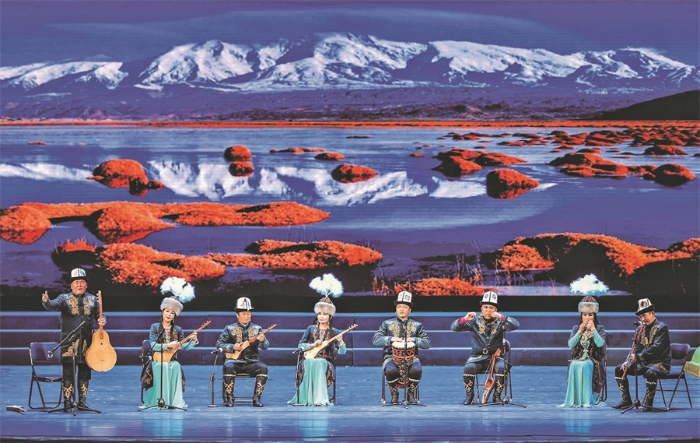The Epic of Manas: A Precious Treasure
2023-05-07 17:56:13 | Author:By Di Yingna and Zhai Ruzeng | Source:en.qstheory.cn2023-05-05
Manas is a renowned epic of the Kirgiz people. On July 13, 2022, while touring Xinjiang Uygur Autonomous Region, President Xi Jinping attended a performance of Manas. He also spoke with the epic’s performers, whom he commended for the compelling power of their rendition. President Xi stressed that cultural heritage assets like Manas are treasures of both various ethnic minority groups and the entire Chinese nation. He called for effective protection, preservation, and collation of such heritage to ensure it is kept alive and flourishes.
Manas tells the story of the eponymous protagonist and his descendants over the course of seven generations as they struggle against the forces of evil. The story reflects a tenacious national character and a national spirit of working in unity for progress. Along with the Epic of Gesar and Jangar, Manas is known as one of the three great epics of China’s ethnic minority groups. The epic has been passed down primarily through oral tradition, with folk performers, known as “Manaschi” in Kirgiz, playing a crucial role in its creation and preservation.
“This story was left to us by our ancestors. It is something I must sing; it is the legacy of our forebears, passed down through the generations to the present day….” These words could always be heard whenever the Manas inheritor, Jusup Mamay, performed the epic during his lifetime. They are a neat summation of Mamay’s life ambition. The epic of Manas, consisting of 236,000 lines, offers a sweeping portrait of Kirgiz culture. However, the oral tradition of Manas, as well as its many variations and varied rhythmic patterns, has posed a great many difficulties in the epic’s preservation.
A richer range of methods were thus needed to preserve such epics and ensure they could be well protected and handed down for generations to come. Thanks to the strong support of the Communist Party of China (CPC) and the government, steps have now been taken to see the great epic of Manas emanating fresh vitality in the new era.
Jangnur Turganbay, a 56-year-old former student of Jusup Mamay, said, “In recent years, the state has provided more financial support for the preservation of Manas and improved the systems for its protection. It has encouraged and supported inheritors and inheritance groups to hold events and form teams with a mix of veteran, and younger members.” Turganbay and his 14-year-old apprentice, Yumtale Etekul, received encouragement from President Xi when they staged their performance of Manas during the president’s visit to the Museum of the Xinjiang Uygur Autonomous Region.

The performance Manas by the Kizilsu Song and Dance Troupe, Xinjiang Uygur Autonomous Region. PHOTO BY CNS REPORTER LIU XIN
“When I met President Xi, my heart swelled with excitement. And when I heard him say that Manas was our treasure, I was moved to tears,” said Turgunbay. “As a Manas inheritor, I’m working harder than ever to train young Manaschi and do my part to protect, preserve, and promote Manas.” Turgunbay has already trained over 30 apprentices. He is happiest when he is teaching his students how to perform the epic.
Yumtale Etekul, a middle school student from Wuqia County, has been singing Manas for more than a decade. “I began singing Manas at the age of three with my mother. Every primary and middle school in Kizilsu Prefecture, whether in an urban or rural area, has set up special Manas classes, and we have been members of the inheritance team since we were young,” said Yumtale. “Meeting President Xi made me both very happy and excited. As a young Manaschi, I’m eager to help more people learn about, understand, and love Manas.”
A Manas research center has now been established in Xinjiang. Additionally, a complete version of Manas, the one sung by the old master Jusup Mamay for almost 80 years, has been compiled into a single edition and translated into multiple languages. Recently, a dress rehearsal of the dance drama Manas was also staged at Kizilsu Cultural Center. Performers brought the heroic epic to life in a new form with vivid body language, accompanied by powerful drum rhythms and the beautiful tones of the komuz, a traditional Kirgiz instrument.
The greatness of an epic lies not only in its grand narrative themes and sublime storytelling, but also in its power to forge emotional bonds and solidarity. It instills in people the strength and desire to improve their lives. This is why epics tend to transcend linguistic and national boundaries and why they have survived since ancient times. Manas is indeed not just a treasure of the Chinese nation, but also a cultural gem along the route of the Belt and Road Initiative, playing an important role in cultural exchanges between countries along its way.
“The world is subject to numberless changes. Valleys run dry and become deserts, wastelands turn to lakes, and lakes then transform into fields. Though all things are ever-changing, the stories of our ancestors have been passed down to this day.” It is highly probable that wherever the music of the komuz can be heard, we will almost certainly find people performing the heroic epic of Manas.
Source: English Edition of Qiushi Journal,No.2,2023
